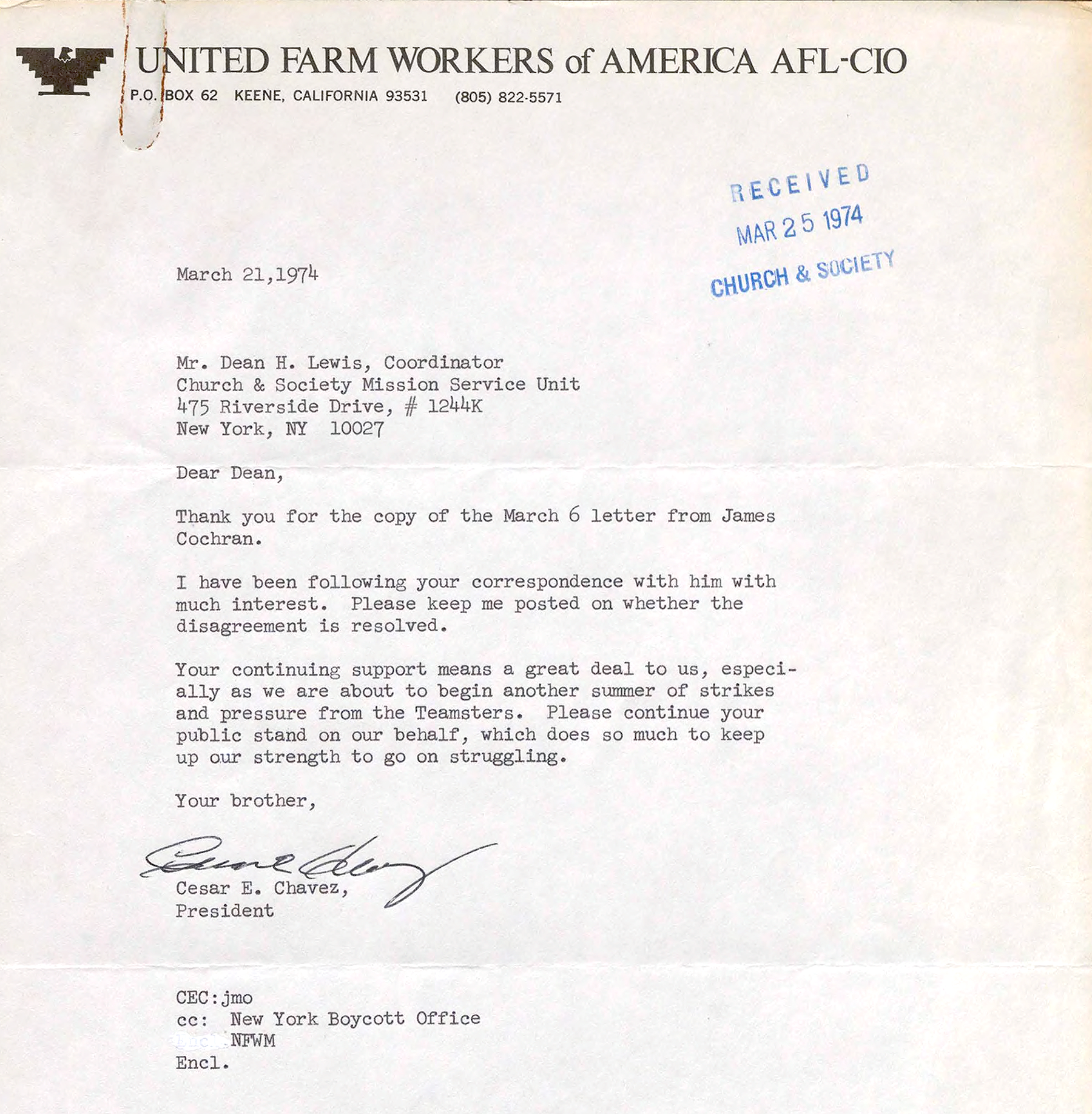
Dean Lewis (center), April 1977. Pearl ID: 344188. All photos courtesy of the Presbyterian Historical Society.
At a 1987 consultation held at Ghost Ranch in New Mexico, Dean Lewis, head of the Presbyterian Church (U.S.A.) office charged with developing social policy, fielded a question about the theological basis of implementing statements of the General Assembly: Under what basis does the Church act in the world?
Lewis answered, in part: “It comes from the fundamental principles of both our predecessor denominations, remember those principles? One is, ‘Truth is an order to goodness.’ We should want to do something about that which we believe. Else, why would it be of any consequence to try to discover the truth?”
The Presbyterian Historical Society (PHS) recently processed more than 190 cubic feet of records documenting the work of the Advisory Council on Church and Society. The collection, Record Group 540, is bureaucratic but strongly molded by the personality and written in the hand of Dean Lewis.

March 21, 1974 letter from labor activist Cesar Chavez to the Church & Society Mission Service Unit. Pearl ID: 344293.
Record Group 540 chronicles the development of social witness in the Presbyterian Church over the course of 30 years, including the contradictions embodied in Dean’s voice and doodles: How does policy become action? How can the body of Christ take up space in the world? Truth is an order to goodness — so what?
With its roots in the Board of Christian Education, the UPCUSA Office of Church and Society (OCS) was responsible for helping the church speak and act with theological conviction and pragmatic effectiveness within and upon the structures and forces of secular society. Alongside its oversight boards and partner offices, OCS would develop and present statements on social issues, known as social pronouncements, to the General Assembly each year. After a 1972 restructuring, the office became the Advisory Council on Church and Society (ACCS). Its work is succeeded by today’s Advisory Committee on Social Witness Policy (ACSWP).

Previous chairpersons and directors of the Advisory Council on Church and Society reunite at Ghost Ranch, August 2002. Pearl ID: 344190.
Included in the records — transferred to PHS by Lewis beginning in 1989 — are examples of OCS’s social witness and documentation of the ways the office attempted to hold the denomination accountable.
In the 1960s, OCS formed the Task Force on the Crisis in the Cities, an urgent response to racial violence and riots in America. The task force’s proposed pronouncements, submitted to and adopted by the 180th General Assembly in 1968, included recommendations to the church to support funding of Black leadership and ministries within cities and urban areas, increase staff in Black congregations and invest in Black-owned businesses and Black-led community development initiatives to combat racial discrimination and poverty in urban Black communities. It also included a blunt reminder: “Too many of us still do not perceive that the crisis of these fearful and violent times is rooted in this history of white racism and violence. Let it be put clearly: the white race has committed a violent and destructive aggression upon the black race in America and continues to use its overwhelmingly superior power in American society to frustrate, dehumanize and deny the existence and aspirations of Negroes.”
Lewis’s service to the church started before his administrative roles in the Office of Church and Society. He was pastor of First Presbyterian Church in Springdale, Arkansas from 1953 to 1958; western area secretary for the UPCUSA’s Division of Evangelism (Board of National Missions) in San Francisco from 1958 to 1960; and secretary in the Adult Program of the Division of Lay Education (Office of Social Education and Evangelism) from 1960 to 1967.
His work within the Church that ordained him and the organization that employed him was necessary but not morally sufficient. Throughout his career, Lewis would both buck against “the system” and seek to bring other mavericks into it.
In the 1990s, working to get back-pension payments into the hands of Cuban Presbyterian ministers, Lewis worked within PC(USA) channels while maintaining a worldly, inpatient spirit. Asked repeatedly how one could get many thousands of dollars from the United States into Cuba, he would reply, “You pack a bag full of cash and fly to Mexico. Then you do like Castro did and rent a boat.”
Learn more about Record Group 540 here. Watch a short video where the authors discuss their processing work here.
This article originally appeared in Presbyterian Heritage, the print newsletter of the Presbyterian Historical Society.
